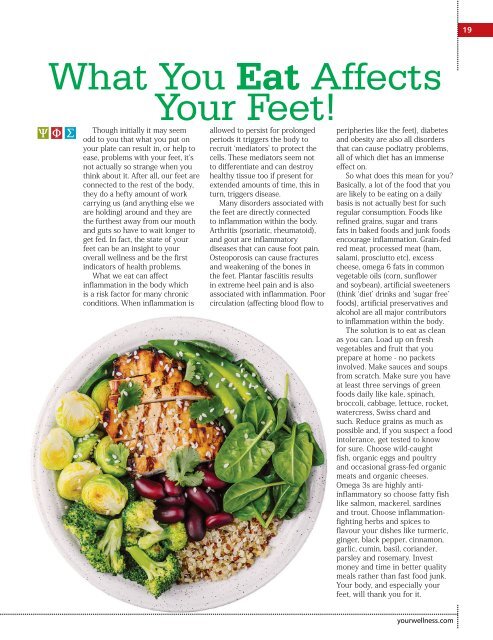Sanda_Issue_January-2019
Create successful ePaper yourself
Turn your PDF publications into a flip-book with our unique Google optimized e-Paper software.
19<br />
What You Eat Affects<br />
Your Feet!<br />
Though initially it may seem<br />
odd to you that what you put on<br />
your plate can result in, or help to<br />
ease, problems with your feet, it's<br />
not actually so strange when you<br />
think about it. After all, our feet are<br />
connected to the rest of the body,<br />
they do a hefty amount of work<br />
carrying us (and anything else we<br />
are holding) around and they are<br />
the furthest away from our mouth<br />
and guts so have to wait longer to<br />
get fed. In fact, the state of your<br />
feet can be an insight to your<br />
overall wellness and be the first<br />
indicators of health problems.<br />
What we eat can affect<br />
inflammation in the body which<br />
is a risk factor for many chronic<br />
conditions. When inflammation is<br />
allowed to persist for prolonged<br />
periods it triggers the body to<br />
recruit ‘mediators’ to protect the<br />
cells. These mediators seem not<br />
to differentiate and can destroy<br />
healthy tissue too if present for<br />
extended amounts of time, this in<br />
turn, triggers disease.<br />
Many disorders associated with<br />
the feet are directly connected<br />
to inflammation within the body.<br />
Arthritis (psoriatic, rheumatoid),<br />
and gout are inflammatory<br />
diseases that can cause foot pain.<br />
Osteoporosis can cause fractures<br />
and weakening of the bones in<br />
the feet. Plantar fasciitis results<br />
in extreme heel pain and is also<br />
associated with inflammation. Poor<br />
circulation (affecting blood flow to<br />
peripheries like the feet), diabetes<br />
and obesity are also all disorders<br />
that can cause podiatry problems,<br />
all of which diet has an immense<br />
effect on.<br />
So what does this mean for you?<br />
Basically, a lot of the food that you<br />
are likely to be eating on a daily<br />
basis is not actually best for such<br />
regular consumption. Foods like<br />
refined grains, sugar and trans<br />
fats in baked foods and junk foods<br />
encourage inflammation. Grain-fed<br />
red meat, processed meat (ham,<br />
salami, prosciutto etc), excess<br />
cheese, omega 6 fats in common<br />
vegetable oils (corn, sunflower<br />
and soybean), artificial sweeteners<br />
(think ‘diet’ drinks and ‘sugar free’<br />
foods), artificial preservatives and<br />
alcohol are all major contributors<br />
to inflammation within the body.<br />
The solution is to eat as clean<br />
as you can. Load up on fresh<br />
vegetables and fruit that you<br />
prepare at home - no packets<br />
involved. Make sauces and soups<br />
from scratch. Make sure you have<br />
at least three servings of green<br />
foods daily like kale, spinach,<br />
broccoli, cabbage, lettuce, rocket,<br />
watercress, Swiss chard and<br />
such. Reduce grains as much as<br />
possible and, if you suspect a food<br />
intolerance, get tested to know<br />
for sure. Choose wild-caught<br />
fish, organic eggs and poultry<br />
and occasional grass-fed organic<br />
meats and organic cheeses.<br />
Omega 3s are highly antiinflammatory<br />
so choose fatty fish<br />
like salmon, mackerel, sardines<br />
and trout. Choose inflammationfighting<br />
herbs and spices to<br />
flavour your dishes like turmeric,<br />
ginger, black pepper, cinnamon,<br />
garlic, cumin, basil, coriander,<br />
parsley and rosemary. Invest<br />
money and time in better quality<br />
meals rather than fast food junk.<br />
Your body, and especially your<br />
feet, will thank you for it.<br />
yourwellness.com
















